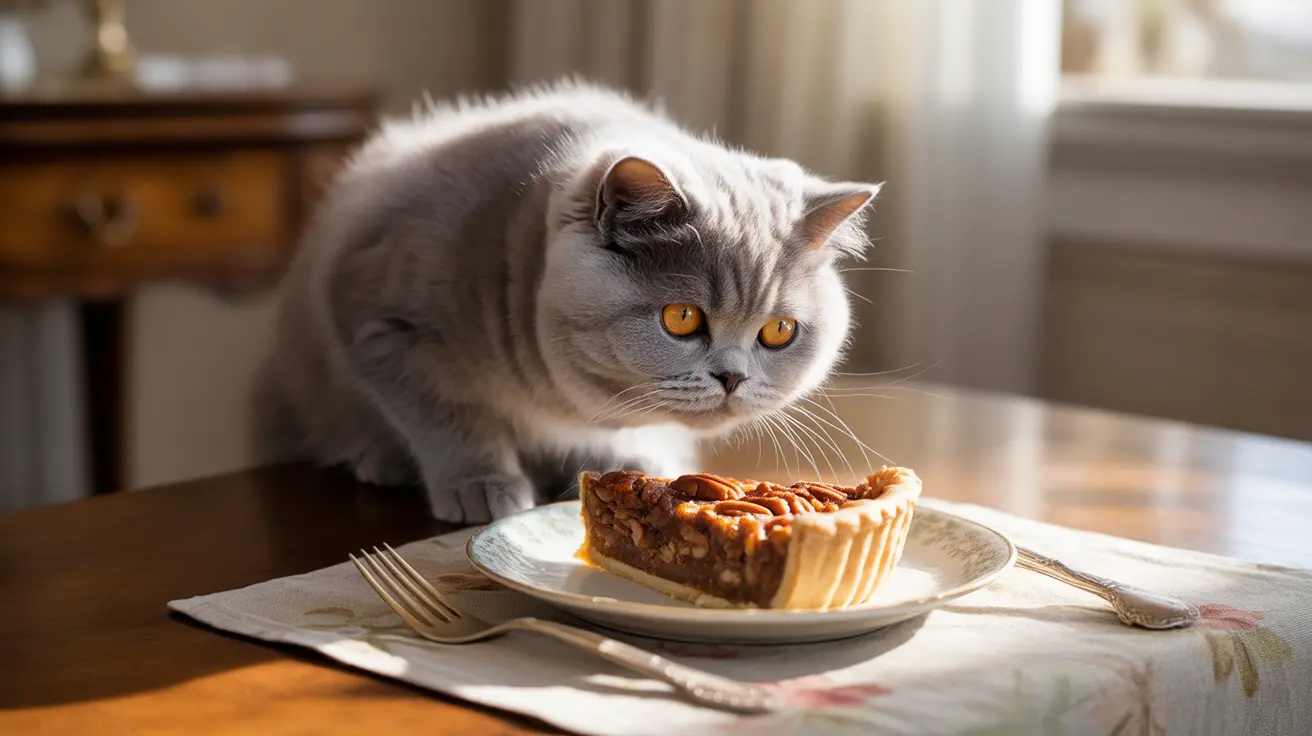As the holiday season approaches, many cat owners wonder about sharing festive treats with their feline friends. Pecan pie, a beloved dessert, often raises questions about its safety for cats. While a tiny taste might not cause immediate harm, there are several important considerations and risks to understand.
In this comprehensive guide, we'll explore the safety of pecan pie for cats, examine its potentially harmful ingredients, and provide expert advice on what to do if your cat consumes this dessert.
Understanding the Risks of Pecan Pie for Cats
Pecan pie contains several ingredients that can be problematic for cats. While not immediately lethal in small amounts, the combination of high sugar content, fats, and potential additives makes it an unsuitable treat for felines.
Key Ingredients and Their Effects
The main components of pecan pie each carry their own risks:
- Pecans: Can cause digestive upset and pose choking hazards
- Sugar syrup: Contributes to obesity and diabetes
- Butter and cream: May trigger lactose intolerance
- Vanilla extract: Contains alcohol, which is toxic to cats
- Spices: Some common additives can be harmful to felines
Health Implications for Cats
Feeding pecan pie to cats can lead to both immediate and long-term health issues:
Short-term Effects
- Gastrointestinal upset
- Vomiting and diarrhea
- Lethargy
- Possible alcohol toxicity from vanilla extract
Long-term Risks
- Weight gain
- Diabetes
- Dental problems
- Potential pancreatic issues
What to Do If Your Cat Eats Pecan Pie
If your cat has consumed pecan pie, follow these steps:
- Assess the amount eaten
- Monitor for immediate symptoms
- Contact your veterinarian if concerned
- Watch for delayed reactions
Safe Alternatives for Cats
Instead of sharing pecan pie, consider these cat-friendly treats:
- Commercial cat treats
- Small pieces of plain, cooked meat
- Veterinarian-approved dental treats
- Cat-specific holiday treats
Frequently Asked Questions
Can cats safely eat pecan pie, and what risks should I be aware of?
Cats should not eat pecan pie. While small amounts aren't usually fatal, the dessert contains ingredients that can cause digestive issues, contribute to obesity, and potentially lead to alcohol toxicity from vanilla extract. The high sugar content and fatty ingredients make it particularly unsuitable for felines.
What symptoms indicate my cat might be having a bad reaction after eating pecan pie?
Watch for signs such as vomiting, diarrhea, lethargy, unusual behavior, excessive thirst, or difficulty breathing. If you notice any of these symptoms, contact your veterinarian immediately.
Are the individual ingredients in pecan pie, like pecans or dairy, toxic or harmful to cats?
While not strictly toxic, many ingredients can be harmful. Pecans can cause digestive issues and pose choking risks, dairy products can trigger lactose intolerance, and vanilla extract contains alcohol which is toxic to cats. The high sugar content is also problematic for feline health.
How much pecan pie is too much for a cat to eat before needing veterinary attention?
Any amount of pecan pie warrants careful monitoring. If your cat consumes more than a tiny taste, or if they eat pie containing alcohol-based extracts or toxic spices, contact your veterinarian for guidance. Better safe than sorry when it comes to non-cat-appropriate foods.
What are safer treat alternatives to pecan pie that I can give my cat during holidays?
Instead of pecan pie, offer cat-specific treats, small pieces of plain cooked turkey (without seasonings), or commercial cat treats designed for special occasions. Always consult with your veterinarian about appropriate treat options for your specific cat.
Conclusion
While it might be tempting to share holiday treats with your cat, pecan pie should be kept strictly off-limits. The combination of potentially harmful ingredients and lack of nutritional value makes it an inappropriate choice for feline consumption. Instead, show your love by offering cat-safe treats and maintaining their regular, healthy diet.






